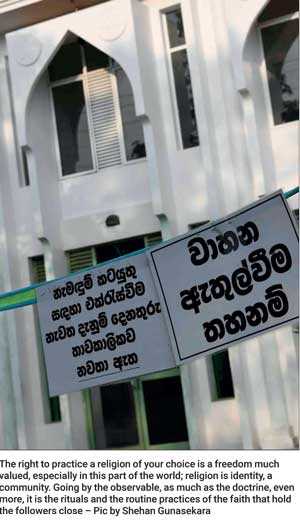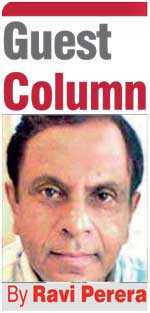Wednesday Feb 18, 2026
Wednesday Feb 18, 2026
Saturday, 11 April 2020 00:01 - - {{hitsCtrl.values.hits}}
 Amidst the gruelling world-wide battle against the COVID-19 phenomenon, at this vulnerable time, unhappy is the appearance of politics of religion.
Amidst the gruelling world-wide battle against the COVID-19 phenomenon, at this vulnerable time, unhappy is the appearance of politics of religion.
In the unprecedented threat it poses to both man and economy, the COVID-19 virus has already jumped every border; attacking all and sundry, with scant regard for race, age, power or wealth. As desperate governments scramble with sweeping measures to contain the peril, they inevitably step on arears ordinarily considered matters of individual choice.
In order to prevent the mingling of people, the main mode of transmitting of the virus, many countries have now ‘locked-down’. Some, like Sri Lanka, have even introduced curfews, considered the most effective way of enforcing a stay at home policy. Borders are closed, airports shut down, roads cleared, work stopped; the world we knew has ceased to function.
We are a secular country, offering a lifestyle which can be broadly described as democratic, enjoying the freedom of movement, work and play. Within the given legal framework, how we work, to where and when we go and what we do are matters of individual choice. But when there is a lock-down or a curfew, naturally, these freedoms are curtailed. It is understood by everyone that in times of crisis, such restrictions are brought about by governments, for the common good of all.
The right to practice a religion of your choice is a freedom much valued, especially in this part of the world; religion is identity, a community. Going by the observable, as much as the doctrine, even more, it is the rituals and the routine practices of the faith that hold the followers close.
From the adherent’s birth to his passing, and many personal events in- between, even daily observances, are meticulously prescribed, although within the religion, the minutiae of many a ritual are often disputed. We observe different sects and even geographical regions having diverse views on religious formalities. Unquestioning faith notwithstanding, not every decree, finds ready acceptance in different climes and different minds.
Predictably, curfews and lock-downs did not win the favour of many elemental believers, for whom, the prescribed observances, override all other considerations. In Israel, orthodox Jews aggressively confronted the Police over their right to conduct religious gatherings, in the face of the lockdown.
In India, in a Muslim dominated area, mobs clashed with health workers who had come to help fight the virus. In Sri Lanka, certain Muslim public figures criticised the decision of the health authorities to cremate, instead of burying, Muslim persons who had succumbed to the COVID-19 virus. Although separated by thousands of miles these incidents are strangely similar, an orthodoxy at odds with reality.
Zoroastrianism
Zoroastrianism is one of the longest practised religions of the world, going back nearly a thousand years before Christ, an era lost in the mists of times, explained only in legend or in reference to much later, mostly uncorroborated, writings.
Originating in what is now East Iran, its teachings, considering the ancientness of the setting, are remarkably sophisticated. Zoroastrian urgings are said to be non-prescriptive, with the individual left with personal choice and discretion, in a quest for good thoughts, words and action. The religion grapples with subtle concepts: duality of life, good and bad, appearance and illusion; contemplating the sacredness of nature, the elements, earth, fire and water.
 Those were isolated times, limiting the spread of Zoroastrianism geographically, although some of its cardinal teachings are said to have influenced later religions which eventually were to become major religions of the world. The seat of the religion, East Iran, was to experience much turmoil; the Persian Empire, Emperor Alexander, the Arabs, the Mongols in sequence trod over the land, each leaving its mark. The Arabs came in the name of a religion, Islam, and soon the Zoroastrians were threatened, a large group taking refuge in India, whence they made home. These immigrants, commonly referred to as Parsees (Pasis) were originally agriculturalists. Taking advantage of the opportunities the British Empire offered, they gradually turned to professions, business and commerce, becoming eventually an overachieving minority in India.
Those were isolated times, limiting the spread of Zoroastrianism geographically, although some of its cardinal teachings are said to have influenced later religions which eventually were to become major religions of the world. The seat of the religion, East Iran, was to experience much turmoil; the Persian Empire, Emperor Alexander, the Arabs, the Mongols in sequence trod over the land, each leaving its mark. The Arabs came in the name of a religion, Islam, and soon the Zoroastrians were threatened, a large group taking refuge in India, whence they made home. These immigrants, commonly referred to as Parsees (Pasis) were originally agriculturalists. Taking advantage of the opportunities the British Empire offered, they gradually turned to professions, business and commerce, becoming eventually an overachieving minority in India.
A census taken of the ethnoreligious group in 2011 found that there were less than 60,000 Parsis in India, a miniscule figure relative to the total population of that country. Their contribution to India however is colossal, recounting which with adequate justice will not be possible in a short article. To give only a bare outline, the Indian independence movement had stalwart Parsis like Pherozehah Mehta, Dadabhoi Naoroji in the forefront. Indian Industries have been raised and shaped by the likes of JRD Tata, Godreji, Wadia; all Parsis, household names in the South Asian business world.
Indira, the only daughter of Jawaharlal Nehru, independent India’s first Prime Minister, married Feroz Gandhi who was from the Parsi community. Indira Gandhi became Prime Minister in 1966. Their son Rajiv Gandhi too was destined to become Prime Minister of India, eventually to be assassinated by the Tamil Tiger terrorist movement of Sri Lanka. India’s first ever Field marshal was Sam Menekshaw, honoured for leading the Indian army successfully against the militarily powerful Pakistan in the war of 1971. Menekshaw is a Parsi.
Funeral rites
For the modern world, the unique funeral rites of the Parsis is a matter of much interest. Unclean is the cadaver, to be rid of without contaminating the basic elements, hence the body is exposed to the sun (at a designated site) to be disposed of by the burning sun and the scavenging birds. There are no graves for the Parsis, instead charities are established in honour of the departed.
However estimable its followers, it is inconceivable that this particular aspect of Parsi funeral rites will be looked at kindly by the authorities, particularly when a pandemic is raging. Modern awareness will rate the danger of contamination from the exposed corpse intolerable.
It has been argued that the WHO (World Health Organization) has recommended both cremation as well as burial in the case of COVID 19 fatalities, however leaving the final decision in the hands of the authorities at ground zero; taking local conditions into consideration, including factors like the number of contacts with the body, time involved before disposal and the distance to transport the body.
The agencies’ recommendations are in general terms, as with most international agencies (with a diverse membership) there is a good amount of politics in the workings of a UN agency. Other than in the most rudimentary matters (wash your hands regularly!), there is an obvious difficulty in recommending a code of conduct applicable across the board, when each country is different in size, soil and climate, as well as in the degree of infection.
The fact is that as of now, there is a gaping knowledge vacuum where COVID-19 is concerned. Today in the news it was announced that a captive Tiger in a New York Zoo had contracted the disease. Does the disease jump from man to animal or carcass to bird? We cannot tell for sure, but it is upon the health authorities in each country to take the safest course of action, rather than regret later.
In a situation as dire, it befits not for a public figure to raise a religious particularity in contradiction of the general welfare. This is not the time to quibble or become obstructionist. As he functions within a larger community, parallel to his religious identity such a person has several other, identities: a representative of the people, law maker and good citizen.
Unless a convert, to a religious identity, one is born; a matter of accident. The other identities must be worked for, the honour earned; mere fact of an election does not make a person a competent law maker or a good citizen.
To find refuge in an accident, when there is a big wide world out there to conquer, is a tragedy.